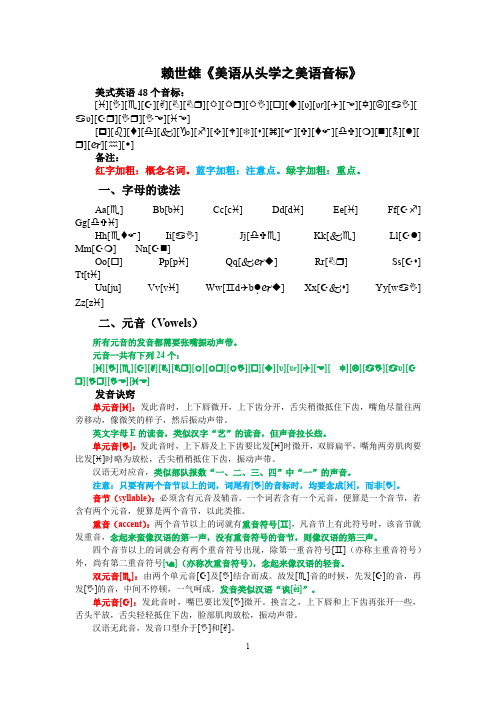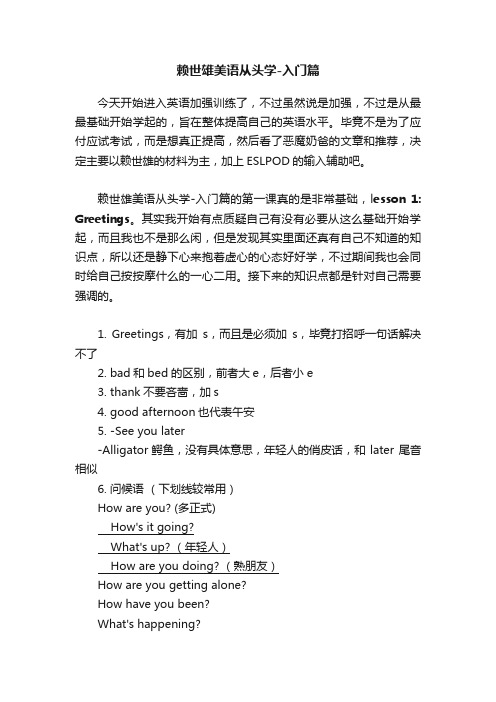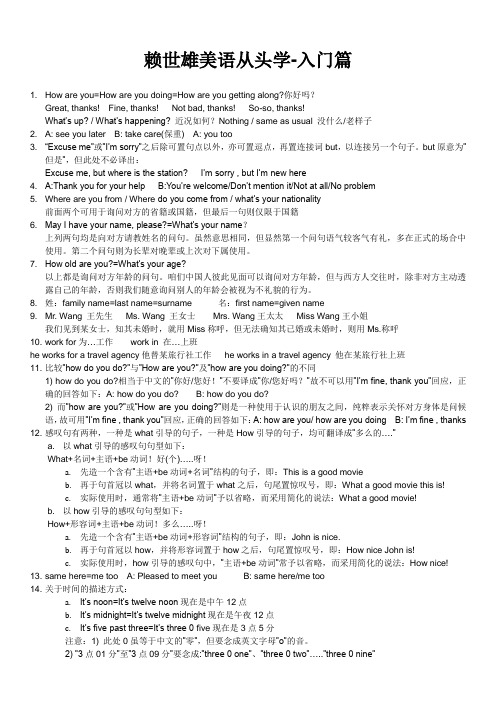d赖世雄高级美语第2课
赖世雄美语从头学之美语音标笔记

赖世雄《美语从头学之美语音标》美式英语48个音标:[♓][✋][♏][☪][✌][ ][ ❒][ ][ ❒][ ✋][☐][◆][υ][υr][✈][☜][✡][☹][♋✋][♋υ][☪❒][✋❒][✋☜][♓☜][☐][♌][♦][♎][ ][♑][♐][ ][ ][❆][♦][ ][☞][✞][♦☞][♎✞][❍][⏹][☠][●][❒][ ][♒][♦]备注:红字加粗:概念名词。
蓝字加粗:注意点。
绿字加粗:重点。
一、字母的读法Aa[♏] Bb[b♓] Cc[c♓] Dd[d♓] Ee[♓] Ff[☪♐] Gg[♎✞♓]Hh[♏♦☞] Ii[♋✋] Jj[♎✞♏] Kk[ ♏] Ll[☪●] Mm[☪❍] Nn[☪⏹]Oo[☐] Pp[p♓] Qq[ ◆] Rr[ ❒] Ss[☪♦] Tt[t♓]Uu[ju] Vv[v♓] Ww[♊d✈b●. ◆] Xx[☪♦] Yy[w♋✋] Zz[z♓]二、元音(Vowels)所有元音的发音都需要张嘴振动声带。
元音一共有下列24个:[♓][✋][♏][☪][✌][ ][ ❒][ ][ ❒][ ✋][☐][◆][υ][υr][✈][☜][ ✡][☹][♋✋][♋υ][☪❒][✋❒][✋☜][♓☜]发音诀窍单元音[♓]:发此音时,上下唇微开,上下齿分开,舌尖稍微抵住下齿,嘴角尽量往两旁移动,像微笑的样子,然后振动声带。
英文字母E的读音,类似汉字“艺”的读音,但声音拉长些。
单元音[✋]:发此音时,上下唇及上下齿要比发[♓]时微开,双唇扁平,嘴角两旁肌肉要比发[♓]时略为放松,舌尖稍稍抵住下齿,振动声带。
汉语无对应音,类似部队报数“一、二、三、四”中“一”的声音。
注意:只要有两个音节以上的词,词尾有[✋]的音标时,均要念成[♓],而非[✋]。
音节(syllable):必须含有元音及辅音。
一个词若含有一个元音,便算是一个音节,若含有两个元音,便算是两个音节,以此类推。
赖世雄中级美语听课笔记Lesson 2

Lesson Two How To Improve Your English生词摘录funny farmmental asylumimprove课文第二课How to Improve Your EnglishDialogue 实用会话Mack is talking to his friend Don.M: Hi, Don! How are you doing (Howdy )in your English class?D: Not so well, I'm afraid.M: What's the problem?D: I'm not improving. Tell me, how come your English is so good?(goof around )M: Well, uh... I have an American girlfriend.D: Aha! That's it. Now I know what to do. (He runs off.)M: Hey, come back! I was just kidding!梅克正在和他的朋友唐聊天。
梅克:嗨,唐!你英文课上得怎么样?唐:恐怕不怎么理想。
梅克:出了什么问题?唐:我一直没进步。
告诉我,为什么你的英文那么棒?梅克:呃,这个吗…我交了个美国女朋友。
唐:啊哈!就是这样。
现在我知道该怎么做了!(他跑走了。
)梅克:嘿,回来啊!我只是在开玩笑!讲解Mack is talking to his friend Don. Mack and Don are both boys. (or men)Mack says, "Hi, Don. How are you doing is your English class?"Don answers, "Not so well, I am afraid."Mack asks, " What is the problem?"and Don tells him, "I am not improving. Tell me, how come your English is so good?" and Mack says, "Well, uh...I have an American girlfriend."Don says, "Aha, That is it. Now I know what to do."He runs off. And Mack says, "Hey, come back. I was just kidding."P: Now I probably would like to hear you speak English only, so introduce yourselfin English againB: Hi, everybody. This is Bruce.P: However, this is basically an English teaching program, so every now and then, of course you will step in and speak Chinese. But most of the time, you will explain the key points, if there is any, in English. So lesson two we will have a short dialogue. Now, by the way, what is meaning of this word "dialogue"?B: A dialogue is a conversation between two people.P: 也就是两个人之间的对话P: And that is spelled?B: conversation or dialogue?P: Dialogue.B: OK. Well, you can see it on page 9 here, "d-i-a-l-o-g-u-e", but it is also spelled "d-i-a-l-o-g". So there are two spellings for this word.哦,有两种拼法 dialogue 这是我们现在看到的拼法,但也有人说dialogP: "dialog", the pronunciation is exactly the same. 发音是完全相同的。
赖世雄英语语法1-30

第一课:主语(名词、代词)She is my mother.They are beautiful.1、动名词(作主语):做过的、有经验、已经事实动词ingStuding english it is fine.2、未作的事情、目的、梦想、计划、理想用不定式(作主语)To 动词原形To buy sth is one of plans.To see him is my purpose.To study abroad is my dream.3、(不定式)主语太长,用it代替,不定式短语放在后面(动名词改成to不定式)It is my plan to study abroad with my friend jone.4、句子作主语要变成名词从句----前面用thatThat she studys hard is true.T hat he doesn't agree with me makes me angry.5、句子长时(作主语)用it代替It makes me angry that he doesn’t agree with me.名词从句有三种:戴慧怡:that引导;whether(yes、no回答的,问句变成的句子做主语)引导;疑问词开头(不能用yes、no回答的疑问句---特殊问句)That she studys hard is true.Is she beautiful ?Whether she is(不能倒装) beautiful remains to be seen.Where will he go?Where he will go(不能倒装) is still a question.To bo a teacher is my dream.Mingic daici budingshi juzi wenju zuoshuyi第三课1、及物动词两种语态:主动或被动我。
他I love her. 主动他被我。
赖世雄教你学英语语法第二章

赖世雄教你学英语语法第二章(总10页)--本页仅作为文档封面,使用时请直接删除即可----内页可以根据需求调整合适字体及大小--第二章两句的连接方法(lesson10-17)第一节连接符号把两个句子连在一起,注意以下两点:1)标点符号:“;”“-”dash破折号“,”:用“,+连词”,连接两个句子。
“;”“-”:具有连词的功能,用于连接两个句子。
“-”破折号:英文最常用的意思是“也就是说”,用来解释前面的句子。
She is a good student.I like him very much.She is a good student;I like him very much. 她是一个好学生,我很喜欢她。
She is a good student-I like him very much.她是一个好学生,我很喜欢她。
He is a good student-he studies hard every day.他是一个好学生,他每天学习很努力。
every day 是副词adv. 放在句尾everyday 是形容词adj. 后面放名词eg:That is his everyday life. 那就是他日常生活。
2)“,+连词”:连接两个句构and而且,同时because因为、so所以、since因为,as因为though虽然、but但是→She is a good student,so I like her very much.她是一个好学生,因此我也很喜欢她。
She is a good student,and I like her very much.她是一个好学生,而且我也很喜欢她。
I like him very much because he is a good student.(because前面没有“,”)我很喜欢他,因为他是一个好学生。
→He is a good student,so I like him very much.他是一个好学生,我很喜欢他。
赖世雄美语从头学-入门篇

赖世雄美语从头学-入门篇今天开始进入英语加强训练了,不过虽然说是加强,不过是从最最基础开始学起的,旨在整体提高自己的英语水平。
毕竟不是为了应付应试考试,而是想真正提高,然后看了恶魔奶爸的文章和推荐,决定主要以赖世雄的材料为主,加上ESLPOD的输入辅助吧。
赖世雄美语从头学-入门篇的第一课真的是非常基础,lesson 1: Greetings。
其实我开始有点质疑自己有没有必要从这么基础开始学起,而且我也不是那么闲,但是发现其实里面还真有自己不知道的知识点,所以还是静下心来抱着虚心的心态好好学,不过期间我也会同时给自己按按摩什么的一心二用。
接下来的知识点都是针对自己需要强调的。
1. Greetings,有加s,而且是必须加s,毕竟打招呼一句话解决不了2. bad和bed的区别,前者大e,后者小e3. thank不要吝啬,加s4. good afternoon也代表午安5. -See you later-Alligator 鳄鱼,没有具体意思,年轻人的俏皮话,和later尾音相似6. 问候语(下划线较常用)How are you? (多正式)How's it going?What's up? (年轻人)How are you doing? (熟朋友)How are you getting alone?How have you been?What's happening?7. 问候答句区别a. 都有youHow are you?=How are you doing?=How are you getting alone?answer:I'm fine, thank you. (跟fine有关的回答持保留意见,比较多说法是一般不用fine这种回答,我个人听到最多的就是good) Fine, thanks.Great, thanks.Not bad, thanks.So-so, thank you.b. How have you been?这个问法是完成时,所以不能用amanswer:I have been fine, thank you.Fine, thank you.c. How's it going?answer: Not bad, thank you.So-so, thank you.Great, thank you.Fine, thank you.d. What's up/What's happening?answer: Nothing much.Same as usual.8. 感谢Thanks a lot. (非正式)Thanks a million (俏皮话)Lesson 2 Courtesy (礼貌)Idiom: Courtesy costs nothing. 礼貌不花钱;礼多人不怪。
赖世雄美语从头学-赖世雄的英语历程

赖世雄美语从头学 -- 赖世雄的英语历程这套《赖世雄美语从头学》系列丛书是专为英语初学者以及想重新学好英文的人士所编写的。
这系列丛书其实是我一生学习英文的缩影。
1961 年,我在台湾念初一时起就接触英文,6年的中学生涯中,由于语法的艰涩用语不易了解,再加上单词背诵需要投入大量的时间及精力,因此懒散的我就索性采取放弃学习的态度,结果在1966年大学联考名落孙山,英文一科竟只得了7分(满分是100分)!就像大多数联考失利的年轻人一样,我选择了当兵,我的英文就是在当兵期间重新学习的。
这段期间我扭转了学习态度,按照自行摸索的方法,竟然让我全凭自修学好英文,后来也考上了公费赴美留学,在美国明尼苏达大学攻读大众传播及英语教学的硕士学位。
惜在念博士课程时内人罹患尿毒症,不得不中断学业,赶返台湾照顾内人迄今。
由于我学英文时,听、说、读、写并重,使我多次在国际性会议中担任同声传译及在大学从事英文教学工作时,皆能游刃有余。
我是怎么学好英语的呢?我天赋平平,只不过秉持了以下3个学习态度,经历了3个学习阶段而已:3 个学习态度:1.善用零星时间:我在走路、等车、坐车、休息的时间都在说英语或看英文书籍。
2.少就是多、慢就是快:我英文程度差,所以每天只看一两句英文,勤查字典,了解句意后,就利用零星时间慢慢地念,一遍又一遍地重复念,竟然使我能够凭声音记住单词、短语或句子,不知不觉中说英语的速度也愈来愈快了。
3.持之以恒、永不放弃:学习语言贵在勤加复习,每日不间断地练习,终有成功的一天。
3 个学习阶段:第1阶段:学习音标我善用零星时间,每天只学 3 至 4 个音标,配合胶质唱片随着外籍老师灌制的录音跟着念,一遍一遍重复地念。
元音学完后,再学辅音,约 2 个星期为一周期,如此反复练习。
3 个月后,我打开字典就可以凭音标念出每一个英文单词的正确发音。
第2阶段:学习入门会话我的做法是:先查字典以了解每一课会话的字词内容,再慢速将会话内容利用零星时间反复念出来,到了下午我会找个无人的地方,以 1 人分饰 2 角的方式把会话表演出来,我一遍又一遍地表演,并不时加入自己曾学过的词汇以扩大会话内容,如此才能活学活用。
(完整版)赖世雄美语音标阿东整理版(可编辑修改word版)

第一章字母的念法1.就发音而言,字母是音标的基础。
字母念不好,音标发音一定不会准确。
因此,练就标准的字母发音是精通英语发音的第一步。
2.什么人应学习字母的发音呢?a.初学英语的人:这种人由于没被错误的发音所“污染”,只要模仿正确的音源,配合本书所列的正确学习方法,短时间就可练好字正腔圆的英语发音。
b.学习英语有一段时间,但念下列字母时,发音类似所列的汉语拼音或汉字发音者英文字母 C G N W汉语拼音xi ji en da bu liu汉字西鸡恩打不溜*以上字母中C 应念成类似“sei”的发音。
G 应念成类似“zhi”的发音。
N 则是“也”的尾音再加“en”的发音组合而成。
W 原是两个“U”组合而成的字母,故应念成“double U”(da bu liu)。
当然,上列所列的字母只是大家容易念错的众多字母中其中可用汉语拼音或汉字念出来的少数几个典型的字母。
其他字母如F、H、J、L、M、R、S、V、X、Z 等,许多人都会念错。
3.从新生儿出发初学发音的朋友,以及学习英语多年却始终学不好发音的朋友,现在就让我们调整心理,把自己想象成新生儿,从头把每一个字母的发音练好。
下列是英文26 个字母,请跟着外籍老师念:Aa Bb Cc Dd Ee Ff Gg Hh Ii Jj Kk Ll Mm Nn Oo Pp Qq Rr Ss Tt Uu Vv Ww Xx Yy Zz以上26 个字母中,大家尤要注意C、F、G、H、J、L、M、N、R、V、W、X、Z 的发音。
本书读者可利用随书附赠的CD 片跟着外籍老师一遍又一遍的念。
这是练就精准发音的惟一之道。
第二章元音元音又称母音。
所有元音的发音都需要张嘴振动声带。
几乎所有的英文字都含有元音,因此我们可以说元音是构成英文字发音的基本元素。
元音一共有下列24 个:(i) (I) (e) (E) (A) (a) (ar) (O) (Or) (OI) (o) (u) (U)(Ur) (V) (J) (R) (K) (ZI) (ZU) (Er) (Ir) (IJ) (iJ) (i)单元音发此音时,上下唇微开,上下齿分开,舌尖稍微抵住下齿,嘴角尽量往两旁移动,像微笑的样子,然后振动声带。
赖世雄美语从头学-入门篇

赖世雄美语从头学-入门篇1. How are you=How are you doing=How are you getting along?你好吗?Great, thanks! Fine, thanks! Not bad, thanks! So-so, thanks!What’s up? / What’s happening?近况如何?Nothing / same as usual 没什么/老样子2. A: see you later B: take care(保重) A: you too3. “Excuse me”或”I’m sorry”之后除可置句点以外,亦可置逗点,再置连接词but,以连接另一个句子。
but原意为”但是”,但此处不必译出:Excuse me, but where is the station? I’m sorry , but I’m new here4. A:Thank you for your help B:You’re welcome/Don’t mention it/Not at all/No problem5. Where are you from / Where do you come from / what’s your nationality前面两个可用于询问对方的省籍或国籍,但最后一句则仅限于国籍6. May I have your name, please?=What’s your name?上列两句均是向对方请教姓名的问句。
虽然意思相同,但显然第一个问句语气较客气有礼,多在正式的场合中使用。
第二个问句则为长辈对晚辈或上次对下属使用。
7. How old are you?=What’s your age?以上都是询问对方年龄的问句。
咱们中国人彼此见面可以询问对方年龄,但与西方人交往时,除非对方主动透露自己的年龄,否则我们随意询问别人的年龄会被视为不礼貌的行为。
- 1、下载文档前请自行甄别文档内容的完整性,平台不提供额外的编辑、内容补充、找答案等附加服务。
- 2、"仅部分预览"的文档,不可在线预览部分如存在完整性等问题,可反馈申请退款(可完整预览的文档不适用该条件!)。
- 3、如文档侵犯您的权益,请联系客服反馈,我们会尽快为您处理(人工客服工作时间:9:00-18:30)。
Welcome back to Radio English on Sunday. Today we have unit two for you, beginning on page ten of your book, we're going to take another look at the United States, but today a very different look from that of last week. Last week we visited the largest city and the most cosmopolitan city in the United States, of course, New York. But today we are going to look at an ethnic groups, which is really quite different from all the others living in the US. Today, then, we are looking at the Amish.---关于Amish, 在中级美语讲座第75,76讲也有提到过。
Ok, let's take a look at our first paragraph.In the land of Rock'n'roll, the space shuttle and computerized living, who could imagine that about fifty thousand Americans do not use telephones, electric lights or cars? Not because they are poor but our of choice. As hard as this may be to imagine, the Amish, or more properly, the Amish Mennonites, still live a traditional rural lifestyle, direct from seventeen century Europe.When we think of the US, we often think of rock'n'roll music, space shuttle and space (sexproration), and of course, all those computers. But today, right now, there're about fifty thousand Americans who don't dance to rock'n'roll, don't know much about the space shuttle, and don't use computers. They don't even use telephones or electric lights. And they don't do this because they are poor or because they jsut don't want them. These people are following a particular lifestyle which is actually not American. It's European, and it's about four hundred years old and in the rest of the article, we'll find out more about these interesting people. / These people are unique, in a sense, that they choose to lead a very simple lifestyle./ Very simple./ If you were on of them, then you will drop there, is this all right?/ Probably I cannot imagine life without a refrigerator. haha.dance to music, 不要说dance with music, 这在中级美语讲座中讲了不知几遍了。
dance with + 人。
out of choice, 出自选择,out of curiosity, 出于好奇心,out of sympathy, 出于同情。
/Out of sympathy, I gave the beggar some change. ---beggar->pauper, 见中级As hard as this may be to imagine, ----> Hard as it may be to imagine,Odd as it may be, ...见中级部分。
这种句构后面绝不要再加but, 英语里不用两个连词的。
Though she is beautiful, I don't like her.Beautiful as she is, I don't like her.To understand these unique Americans better, it is necessary to understand their history.Beginning with the revolution started by (Marton Loser 人名),leader of the Protestant Reformation in Germany in the sixteen century, Europe was wracked by religious wars for several hundred years. Modern Europe is a product of these wars, and of the political and religious philosophies of those times.The main figures in this tragic period were the Roman Catholic Church and the Protestants, those who rebelled against papal rule from Rome. Among the thousands of splinter groups formed outside of Rome's religious rule were the Mennonites, a group of particularly conservative, rural Christians situated in what is today Switzerland, part of eastern France, and southern Germany.papal: 罗马教皇的,---这种鸟字好象一般也碰不到。
---6:42----Pan: What makes Peter Lai's <Advanced American English> sound boring like this? It's probably because that they talked too much about the American culture. Like this lesson, until now I know almost nothing about the Amish and I never think I have any interest in this race.What's another factor? To learn about their culture, you've got to learn a lot of meaningless names of persons and places, which always makes things like a language more boring and dull to death. Gosh! Do I have to learn these goddamn names? I am not at all interested in how they came to be and where they hailed from.Well, people say, to learn a language well, to learn their culture well! Isn't it something of Americanization? I am sick of that, but do I have alternative?So, let me just set my teeth and go ahead!Ok. Summary of this paragraph would be what we see in the first sentence, the key word, history. That is if you want to understand today's Amish, we have to go back to Europe, where they, or their ideas came from, and goes all the way back to the sixteen century.Well, to make a long story short, we can say that because of all the religious wars in Europe, first, the Rome Catholic Church was the only Christian church in Europe, but during the sixteen century, the other northern and western groups of Europeans rebelled against, or broke away from, rule in Rome for (the catholic church ,) and set up hundreds and even thousands of small churches, which we called Protestants. One of these was the Mennonites, and they used to live in Switzerland 瑞士, part of eastern France and southern Germany./ Well, this paragraph in terms of (..) usage, plicated, however, we do have very beautiful translation.to be wracked by religious wars...what does this "wracked" mean?/Well, let me give you another example I think you can get the idea, we say that a person hasa very very high fever, maybe has with malaria, that his body is wracked by the fever. So this great shaking and trembling when someone has a very high fever. And if a country or an area is wracked by war, it is shaken by this war, it is almost destroyed by this or these great wars. /wracked, 几乎被破坏的,-->ruined,to rebel against, --->rebellious, adj,To make a long story short, the Mennonite Amish was so conservative that they made more enemies and friends. In order to preserve their peculiar lifestyle, they begain to immigrate to the British Colonies in North America in about seventeen twenty before Canada and the United States were formed as independent countries. There they found the riligous freedom they had sought. Amish settlements sprang up in the colonies and territories of (Pensovania 地名) Ohio 俄亥俄and Indiana as well as in (Onterial地名) in what is today, Canada. Surprisingly, there are no Amish groups today in Europe.----seek, sought, sought, --->pursueTo try to locate or discover; search for.寻找试图寻找或发现;寻找To endeavor to obtain or reach:追求努力得到或达到:seek a college education.努力获得高等教育seek fame求名seek help求助seek one's home回家seek one's bed就寝I have never sought to hide my views.我从不企图隐瞒自已的观点。
